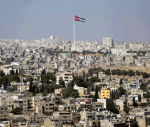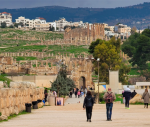Deputy Mustafa Hamarneh’s criticism of what he called the “political framing” of the function of tribes in Jordan, which, he said, may eventually cause them to operate like non-militarised militias, has insulted “tribal” Jordanians.
More importantly, it has opened a very important debate about the real contribution of tribes to unifying the Jordanian identity and, with it, a system of governance based on the rule of the law and equality among all citizens.
Some tribes are feeling targeted by the new narrative that questions their special relationship with the regime and the advantages they have received — in employment and education primarily — over the decades as a result of that special relationship.
Critics have linked that advantage to several high profile “corruption” cases that remain unchallenged and claim that tribes seek to organise themselves into smaller “tribe-based” political units in order to maintain that advantage during this time of political change.
Tribal advantage in Jordan is an unstudied and unscrutinised phenomenon and, at some level, it is also a myth. Because in the same way that not all Jordanians are equal, not all tribes are equal either (in the eyes of the political webmasters in Jordan).
A blanket statement which claims that all tribes in Jordan received benefits forgets the bias against some tribes and the favouring of others.
The truth is that “some” tribes received benefits, “some” tribal figures were behind large-scale corruption cases and “some” tribes are turning into “non-militarised militia” working outside the law to their own narrow advantage.
Other tribes are just as downtrodden and disadvantaged as the rest of Jordanians.
Hamarneh’s mistake was to omit the disclaimer “some” in his statement about tribes, which would have accurately allowed for the fact that “tribes” are not a uniform group with equal standing in the Jordanian system.
In Jordan, there are tribes who have and tribes who have not.
The first group, therefore, rejected the MP’s statements because they do not want to be exposed or challenged, and the second group knows that it did not enjoy any amazing advantages (as a collective group, although there are individual cases who did) and therefore resent being tarnished by this image.
It is complicated. But debates such as the one we are having now will, I believe, help untangle the web of advantage and disadvantage which, due to public silence about the issue, has become more and more intricate and difficult to decipher over the decades.
Where for decades the “system” played us against each other under a variety of subheadings, ethnic and political, we may finally be seeing the unravelling of a very important debate in which all sides are finally showing their cards to each other.
What we will be able to get out of this is an understanding of the fears of all sides, their concerns and aspirations, and hopefully find enough common denominators — and compassion — to all work together on building the Jordan that we all want and can treat us all equally as per our constitution and international standards.
I have hope that debates like these, although temporarily violent, accusatory and often nonsensical in their expectations and claims, are a prelude to some amazing revelation about how critical it will become for all of us to move forward when we finally see each other as just Jordanians, without any addendums and appendices.
That would be truly a Jordanian Spring.













